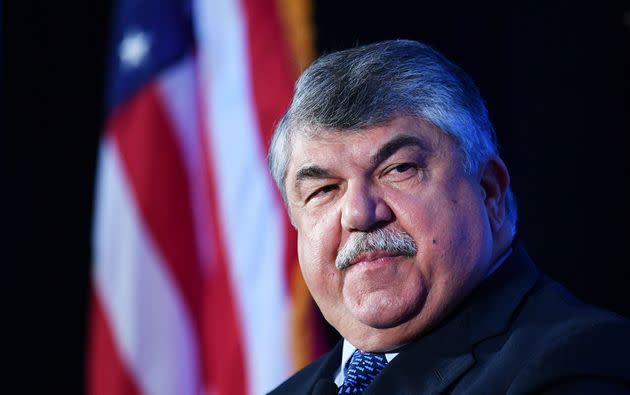Richard Trumka, AFL-CIO President, Dies At 72

AFL-CIO President Richard Trumka, a third-generation miner who went on to lead the largest U.S. labor federation for more than a decade, has died at age 72, Senate Majority Leader Chuck Schumer announced Thursday.
The AFL-CIO confirmed Trumka’s passing in a statement, calling him a “relentless champion of workers’ rights.” He died of what was believed to be a heart attack, according to Politico, which was the first to report the news.
Trumka was born outside Pittsburgh. After graduating from Pennsylvania State University and earning a law degree from Villanova, he became a staff attorney for the United Mine Workers of America (UMWA) in the 1970s and began leading the organization in 1982.
He led successful, high-profile strikes against Pittston Coal Company and Peabody Coal in the late 1980s and early 1990s, and became secretary-treasurer of the AFL-CIO in 1995 and president in 2009.
Schumer, choking back tears Thursday, said working people had lost “a fierce warrior.”
As the head of the AFL-CIO, the burly and mustachioed Trumka steered a federation that includes more than 50 unions representing more than 12 million workers. He rose to the top post after a decades-long decline in union membership in the U.S., and spent his tenure trying to fight back against right-to-work laws and other policies aimed at weakening unions.
Trumka was a key political ally to Presidents Barack Obama and Joe Biden, and was leading an effort to institute landmark reforms to federal labor laws when he died. Lee Saunders, president of the American Federation of State, County and Municipal Employees, called Trumka “one of the nation’s fiercest, most effective advocates for working people ever.”
“Rich has never relented in the struggle to ensure that working people are able to have lives of dignity and security,” Saunders said.
UMWA president Cecil Roberts said in a statement that the labor movement had “lost a giant.”
The president of the AFL-CIO has to bridge different factions within the federation that don’t always agree on policy. One of Trumka’s best-remembered speeches will be the one he delivered on racial justice in St. Louis in 2014, following the killing of an 18-year-old Black man, Michael Brown, by a police officer. In his remarks, Trumka said that “our brother killed our sister’s son” ― a reference to Darren Wilson, the police officer, and Brown’s mother, Lezley McSpadden, a unionized grocery store worker.
“If we in the labor movement truly want to act as a positive force for change around issues of racism and classism we have to acknowledge our own shortcomings,” Trumka said.
This article originally appeared on HuffPost and has been updated.

 Yahoo Finance
Yahoo Finance 